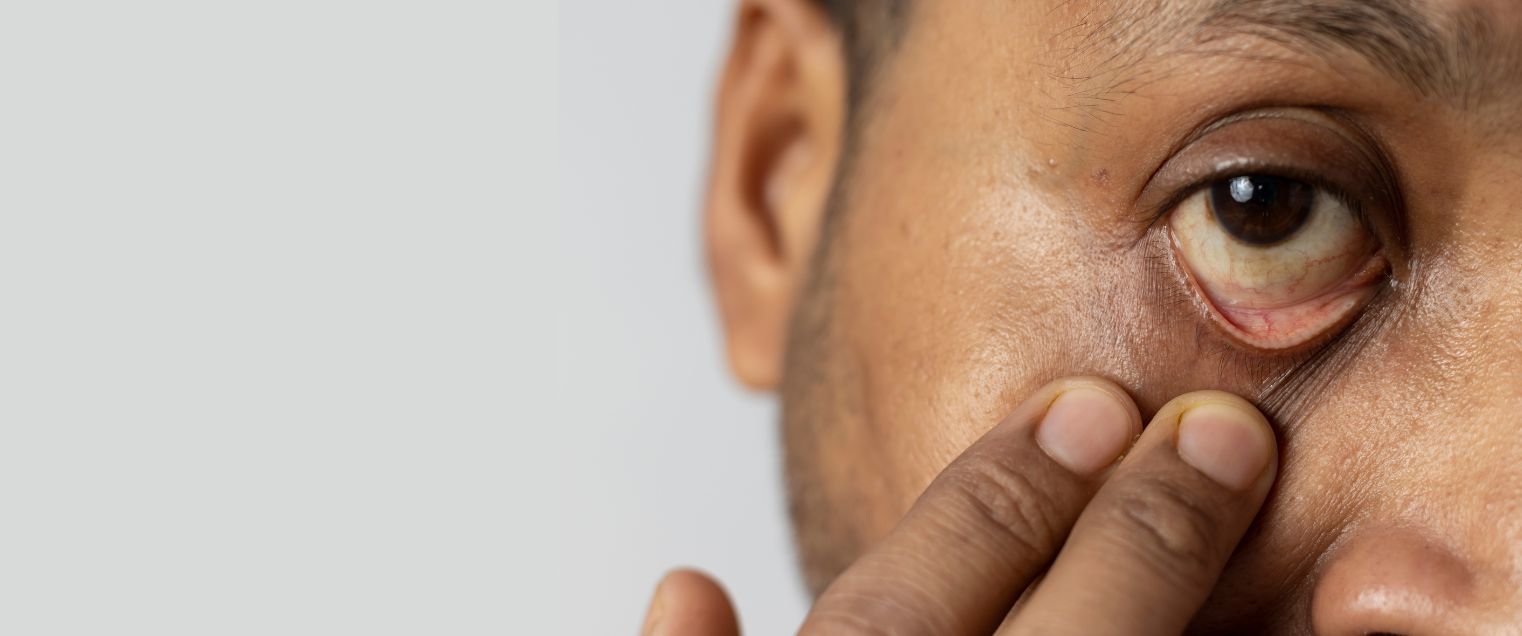
Jaundice is a condition that occurs when there’s an excessive amount of bilirubin in the blood, leading to a yellowing of the skin, eyes, and mucous membranes. While jaundice itself is not a disease, it’s a sign of an underlying health issue, often related to the liver, gallbladder, or pancreas. Recognizing the early signs and symptoms of jaundice at home can help you seek timely medical attention and prevent complications. In this blog, we’ll discuss what jaundice is, its early symptoms, and how to identify them timely.
Bilirubin is a yellow pigment that is produced when red blood cells break down. Normally, the liver processes bilirubin and excretes it through bile. When there’s a disruption in this process—due to liver dysfunction, bile duct blockage, or excessive breakdown of red blood cells—bilirubin builds up in the bloodstream, leading to jaundice. Jaundice can affect people of all ages but is especially common in newborns, individuals with liver disease, or those experiencing bile duct obstructions.
Jaundice is not a condition to be taken lightly as it often signals underlying health problems. Timely detection and diagnosis are crucial for effective treatment and recovery.
The symptoms of jaundice can vary depending on its cause and severity. However, there are several hallmark signs and symptoms of jaundice that you can observe:
This is the most noticeable and defining symptom of jaundice. The yellow discoloration typically begins in the whites of the eyes (sclera) and then spreads to the skin. It’s often more evident under natural light.
Urine may appear unusually dark yellow or even brown, resembling tea or cola. This happens because excess bilirubin is excreted through urine.
Stools may become light gray, clay-colored, or pale due to a lack of bile, which gives stool its normal brown color.
Persistent tiredness and lack of energy are common symptoms of jaundice as the body struggles with underlying liver issues.
Accumulation of bile salts under the skin can cause intense itching, often without a visible rash.
Jaundice can lead to a decreased desire to eat, resulting in weight loss if left untreated.
Digestive disturbances like nausea and occasional vomiting may accompany jaundice.
Pain or discomfort, particularly in the upper right quadrant of the abdomen, could signal issues with the liver or gallbladder.
Recognizing jaundice in its early stages is essential for prompt medical attention. Here are steps you can take to check for early signs of jaundice at home:
Observe your skin color under natural light. Look closely at areas such as the face, palms, and soles of the feet. A subtle yellow hue might indicate the onset of jaundice.
Check the whites of your eyes (sclera) in bright, natural light. The presence of a yellowish tint here is often one of the earliest signs of jaundice.
Pay attention to the color of your urine, especially in the morning. If it appears darker than usual despite staying hydrated, this could be an early sign of jaundice.
Take note of the color of your stools. Pale, clay-colored, or whitish stools might suggest that your bile ducts are not functioning properly.
Feeling unusually tired or weak without an apparent reason may signal that your liver is not functioning optimally.
Persistent itching, particularly in the absence of visible skin conditions, could indicate a buildup of bilirubin in the bloodstream.
Newborn jaundice is a common condition that typically appears within the first week of life. It occurs because a baby’s liver may not yet be mature enough to process bilirubin effectively. Parents can check for signs of jaundice in their newborn by:
Gently press your baby’s skin on the forehead or nose and observe the color when you release the pressure. If it appears yellow, your baby may have jaundice.
Look for a yellowish tint in the whites of your baby’s eyes.
Poor feeding, lethargy, or unusual fussiness could be associated with jaundice.
Take note of dark urine stains or pale stools in your baby’s diaper, as these may indicate jaundice.
Newborn jaundice often resolves on its own, but severe cases require medical intervention.
“Black jaundice” is an old term historically used to describe severe jaundice, often linked to serious infections like leptospirosis or advanced liver failure. It’s characterized by the following symptoms:
Black jaundice requires immediate medical attention and intensive treatment.
The underlying causes of jaundice can range from mild to severe. Common causes include:
1. Liver Diseases:
2. Bile Duct Disorders:
3. Blood Disorders:
4. Infections:
5. Newborn Jaundice:
If you notice any of the signs of jaundice, consult a healthcare professional immediately. While mild jaundice may resolve on its own, severe or prolonged symptoms could indicate a serious underlying condition requiring prompt medical intervention.
Although some causes of jaundice are unavoidable, certain lifestyle habits can help reduce your risk:
Also, read: Diet Chart for Jaundice Patients
Drink plenty of water to support overall liver function.
Schedule regular check-ups and liver function tests, especially if you have a history of liver disease.
Recognizing the early signs of jaundice at home can lead to timely diagnosis and treatment, preventing complications. Pay attention to changes in skin color, eye appearance, urine, and stool. Jaundice often signals an underlying health issue that requires professional evaluation. For expert diagnosis and care, consult Dr. Abhishek Yadav, who can provide personalized jaundice treatment plans based on your condition. Stay vigilant and proactive about your health—it’s the best investment you can make.
Noticing signs of jaundice like yellowing skin or dark urine? Contact Dr. Abhishek Yadav for a timely diagnosis and expert care. Schedule your consultation now!